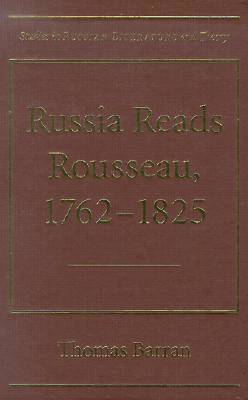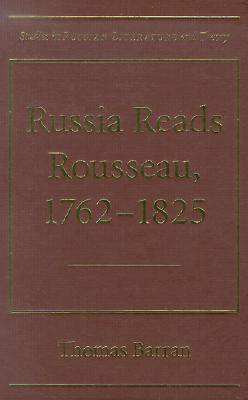
- Afhalen na 1 uur in een winkel met voorraad
- Gratis thuislevering in België vanaf € 30
- Ruim aanbod met 7 miljoen producten
- Afhalen na 1 uur in een winkel met voorraad
- Gratis thuislevering in België vanaf € 30
- Ruim aanbod met 7 miljoen producten
Zoeken
Omschrijving
Whether seen as a literary genius, educator, dedicated patriot, misanthrope, scoundrel, proto-Jacobin, or out-right lunatic, Jean-Jacques Rousseau left a bewildering pattern on the Russian intellectual landscape. Fully tracing this pattern for the first time, this book reveals the nature and extent of Rousseau's initial influence in Russia, as well as a great deal about the social, cultural, and political contexts in which he was so variously understood by the Russians. Thomas Barran shows here how Rousseau quickly became a model of the visionary to the Russians. Russia Reads Rousseau makes explicit the selectivity, ambivalence, and energy with which Russians accepted Rousseau's works. Barran's book provides a refreshing corrective to the numerous misinterpretations by both Russian authors who introduced Rousseau to Russia and scholars who have analyzed the Russian reception of Rousseau. Mapping Rousseau's varied and extensive influence, Barran considers major writers such as Denis Fonvizin, Nikolai Novikov, Nikolai Karamzin, and Aleksandr Pushkin, as well as lesser known or forgotten figures. He shows how Rousseau's works were Russianized in numerous ways, as translations, adaptat
Specificaties
Betrokkenen
- Auteur(s):
- Uitgeverij:
Inhoud
- Aantal bladzijden:
- 404
- Taal:
- Engels
- Reeks:
Eigenschappen
- Productcode (EAN):
- 9780810118447
- Verschijningsdatum:
- 21/08/2002
- Uitvoering:
- Hardcover
- Formaat:
- Genaaid
- Afmetingen:
- 155 mm x 246 mm
- Gewicht:
- 716 g

Alleen bij Standaard Boekhandel
+ 231 punten op je klantenkaart van Standaard Boekhandel
Beoordelingen
We publiceren alleen reviews die voldoen aan de voorwaarden voor reviews. Bekijk onze voorwaarden voor reviews.








